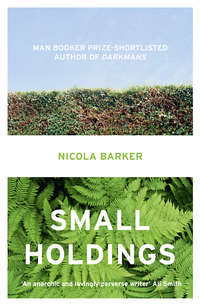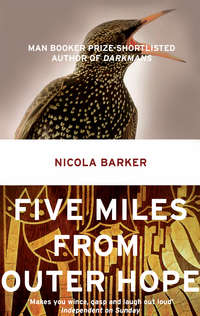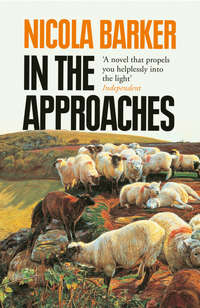
Полная версия
The Yips
Ransom chuckles to himself as he carefully turns over the corner of the page (for future reference), closes the book and shoves it under his elbow along with the Clausewitz.
His eye now settles on a tiny copy of Sun Tzu’s Art of War, which has been secreted, sideways, on top of a row. He pulls it out with a small, wry smile of recognition. It’s a miniature hardback – under three inches in width – wrapped, like an expensive chocolate, in shiny black, red and silver foil-effect paper. He enjoys the sumptuous feel of it in his hand. He opens it up.
‘Simulated chaos is given birth from control,’ he reads. ‘The illusion of fear is given birth from courage; feigned weakness is given birth from strength.’
He muses on this for a moment, his attention briefly distracted by the sound of a phone ringing in a far corner of the house. He can tell from the distinctive ringtone (Queen’s ‘We Are The Champions’) that it is his phone. He scowls. The ringing stops. His eye returns to the Sun Tzu and he slowly re-reads the previous sentence: ‘Simulated chaos is given birth from control; the illusion of fear is given birth from courage; feigned weakness is given birth from strength.’
Ransom considers this for a while, then he smiles, almost sentimentally, closes the book, carefully slots it under his elbow (alongside the other two) and is about to grab his cereal and move away when his eye alights on a distinctive-looking beige and black hardback with an old-fashioned drawing of an open palm on its spine. He pauses. His mind turns – very briefly – to the previous evening and to Jen.
Ah yes, Jen. Jen with her pale arms, her chapped upper lip and her infinite lashes. Jen with her ponytails and her pierced – and piercing – tongue. Jen. He winces. He draws in closer. Written above the illustrated hand he reads: Cheiro’s Palmistry for All; 2/6 NET.
‘Cheiro?’ He pronounces the name out loud, as if trying it on for size.
‘Cheiro.’
He pauses. Then, ‘Goll-uff,’ he murmurs, quizzically. ‘Gol-ol-ol-ol …’
He shakes his head. ‘Cheiro! Cheiro! Cheiro!’
He tweets the name like a canary, then snorts, pulls the book out and opens it up, randomly, to ‘an autographed impression of Lord Kitchener’s hand given to “Cheiro”’ –
‘Eh?’
– ‘on the 21st of July, 1894 (hitherto unpublished).’
As he gazes down at the photograph, two important things happen. The first is that the boy – the stroppy, dark-haired teenager – enters the room, holding out a dripping mobile.
‘I just found this in the toilet bowl,’ he’s saying. ‘Is it yours by any chance?’
The second is that a loose wad of papers falls down from within the pages of the palmistry book – an old letter, a dried flower, a couple of photos, the order of service for a funeral …
Ransom curses, loudly, as the order of service and the photo slide down on to the floor, but the dried flower and the letter plop into his cereal bowl. He instinctively snatches for the letter – keen to preserve it – but, in his panic, he clumsily knocks his knuckle into the fork and tips up the bowl, sending it (and all its contents) cascading down on to the carpet.
Ransom stares at the milky, wheaten mess, agog.
‘Wow!’ The boy is impressed (and Ransom can instantly deduce that it takes a fair amount to impress this kid): ‘You really fucked up,’ he announces, delighted (like all teenagers, immeasurably enlivened by the prospect of a catastrophe), ‘that stuff belonged to Mallory’s dead mum.’
Ransom’s already on his knees, yelping plaintively, plucking photos and dried flowers from the goo.
‘Kitchen roll,’ the boy announces, sagely, and then promptly abandons him.
‘I don’t understand,’ the woman mutters, peering over Gene’s shoulder. ‘You’ve come to collect Nessa, but now that you’re here you’ve decided to …’
‘Read the meter. Yeah.’ Gene tries to sound nonchalant as he straightens up, switches off his torch and scribbles the relevant digits on to his clipboard. ‘It’ll save me from bothering you twice, that’s all.’
‘I see.’
The woman gives this some thought, and then, ‘But you are actually friends with Valentine?’ she demands (she is short and heavy-hipped, with long, wavy, black hair, down to her waist, and a piercing, brown gaze). ‘I mean you do actually know each other?’
‘Uh …’ Gene frowns. He senses trouble. ‘Uh … Yes. Yes. Of course I know Valentine,’ he insists. ‘Of course I do.’
‘Of course you do.’ The woman laughs, nervously, then smiles up at him, somewhat ruefully. ‘God – I’m getting so cynical in my old age! I mean it’s hardly as if you just turned up at her house to read her meter and then the next thing you know she’s railroading you into …’
Gene clears his throat and glances off, sideways.
The woman pauses, alarmed. ‘I mean she wouldn’t …?’
‘Good gracious, no!’ Gene exclaims. ‘That would be …’ He struggles to find the right word, but can’t; ‘pathetic,’ he eventually manages.
Pathetic?
‘Yes.’ The woman’s keen, dark eyes search his face. ‘Sorry,’ she eventually apologizes (plainly mollified by whatever it is that she finds there), ‘you must think I’m completely paranoid.’ She shakes her head, exasperated, then turns and guides him down the corridor. ‘It’s just that I’ve known Vee since she was a teenager’ – she glances over her shoulder, raising a single, deeply expressive, black brow – ‘and she’s always had this incredible gift – this … this knack – for making people feel …’
She suddenly checks herself. ‘Have you been friends with Vee for long, then?’
‘Long?’ Gene parrots, like the word is somehow incomprehensible to him.
‘Yeah. Long. Long …’ She rolls her eyes, sardonically. ‘As in how’d the two of you first become acquainted?’
‘Uh …’ Gene tries to think on his feet. ‘I work in a bar. At the Thistle. In town.’
‘Okay …’
The woman nods, as if expecting something more.
‘It’s not full-time,’ he elects, ‘I just fill in when they’re short-staffed, sometimes.’
‘Right.’ The woman sniffs, nonplussed. She is silent for a moment and then, ‘Well it really has been incredibly tough on her,’ she confides (determined – in spite of Gene’s best efforts – to broaden the level of their interaction). ‘I mean what happened to her mother …’ She shudders. ‘And to lose her dad like that. Then all the problems with her brother. Then her sister-in-law being carted off into …’
She points her finger to her temple and rotates it.
‘Awful,’ Gene confirms, in studied tones.
‘Devastating,’ the woman persists. ‘And I do think she’s coped extremely well …’ she concedes (perhaps a little grudgingly), ‘I mean under the circumstances. Although in some respects she barely copes at all – just doesn’t have the emotional …’ She rotates her hands, struggling to find the correct adjective. ‘Chutzpah!’ she eventually finishes off.
They arrive at the kitchen door. She pushes it open and waves him through.
‘I blame the parents, obviously …’
She grimaces, self-deprecatingly, after delivering this cliché. ‘D’you have kids of your own?’
‘A couple.’ Gene nods. ‘A boy and a girl …’ He pauses. ‘Both adopted,’ he qualifies.
‘I mean I love Vee,’ she insists (barely acknowledging his answer). ‘Who doesn’t love Vee? She’s a wonderful girl. Very sweet. Very creative. Very genuine. Just a bit of a lame duck, really …’ She pauses, thoughtfully. ‘Reggie’s at the root of it all.’ She sighs. ‘Did you ever have the honour of meeting Vee’s dad?’
‘Vee’s dad?’ Gene frowns. ‘No. No. I don’t believe we ever …’
He passes through the door and then waits, politely, at the other side. Directly ahead of him is a large, kitchen table (currently covered in piles of washing), and beyond that, an open door which leads out into a long, lush and meandering back garden where a gang of children – mainly boys – can be seen playing together on a trampoline.
‘So you work two jobs?’
‘Pardon?’
Gene drags his eyes away from the carefree scene outside. The woman has grabbed a pair of matching socks from a prodigious, cotton-mix hillock and is now deftly rolling them into a single ball.
‘Two jobs?’ she repeats, inclining her head towards his clipboard.
‘Uh –’
‘Of course Reg adored Vee,’ she interrupts him, identifying a second pair and grabbing them. ‘She was the apple of his eye. Reg doted on the girl. Although he could be very strict with her – quite domineering – overbearing, even, on occasion. In fact I read this excellent article recently about how people with Vee’s …’ she pauses, delicately, ‘… problem …’ She pauses again. ‘I mean I suppose you should call it an illness, really …’ She looks to Gene for confirmation. Gene just gazes – pointedly – back out into the garden.
‘Well they normally have an overbearing father-figure,’ she persists, ‘a controlling dad. That’s apparently very common …’
While she’s speaking the woman is rolling up her shirtsleeve: ‘Here – take a look …’
She shows Gene a large, black and grey tattoo on her forearm which depicts a coffin lying on a bed of roses, inscribed with the words: MUM, RIP, 1946–1998.
Gene inspects the tattoo.
‘It’s a Reggie T original.’
She smiles up at him, proudly.
Gene re-examines the tattoo more closely. It’s certainly a fine piece of work: delicately inked, distinctive, very traditional.
‘D’you like it?’ she demands (possibly irritated by his protracted silence).
‘It’s great,’ he answers, a little awkwardly. ‘I mean it’s extremely’ – he frowns – ‘accomplished.’
She gazes down at the tattoo herself, somewhat mollified. ‘He was a filthy old bigot,’ she grumbles, unrolling her sleeve again. ‘A neighbour once told me how he developed his hatred of all foreigners after his mum had an affair with an American serviceman during the war. His dad went crazy when he found out. Did a hike. Reg was only a toddler at the time, but he never got over it.’
‘That’s tough,’ Gene volunteers, blandly.
‘Although – to Reggie’s credit – he’d never be rude to your face. Not directly. He was very charming in person. Very amiable. Always campaigned for the NF or the BNP at election time. Stood as the borough candidate every opportunity he got. Made no secret of his views, but was never nasty about it, never rude. I mean I’m half Filipino. My dad was from the Philippines. They’d play darts together down the –’
Her monologue is briefly interrupted by a sharp, girlish scream from the garden. She moves over towards the open doorway and blinks out into the bright sunlight.
‘Got any yourself?’ she wonders, after a short pause.
‘Sorry?’
‘Her last man was covered in them.’ She turns, patting her forearm, by way of explanation, ‘Hands, legs, feet. Had this massive, tangerine-coloured carp swimming across his neck – its eye just’ – she points to her throat – ‘just there. On his Adam’s apple. It’d bob up and down whenever he spoke.’ She grins. ‘Russian, he was. Size of a house. But wouldn’t say boo to a goose. Gentle as a mouse. Lovely boy. Ran off to live on an Indian commune with this woman they call “The Hugging Saint”. Very weird. Very weird. Did Vee ever tell you about all that?’
‘Uh, no. No she didn’t.’
Gene frowns, uneasily, his cheeks reddening. ‘And just for the record …’
As he speaks, another sharp, girlish scream resounds around the garden. The woman turns and peers outside again, shading her eyes with her hand this time.
‘Would you believe it?’ she mutters. ‘The little devil’s climbed straight back on again after I clearly told her …’
Gene glances outside himself. In the garden he sees a small girl bouncing up and down on a trampoline wearing a short, white, cotton dress and no underwear. As she bounces, a group of older boys stand nearby in a furtive huddle, watching on.
‘Awful, isn’t it?’ The woman turns and observes Gene’s slightly queasy look. Then, before he can answer, ‘In fact I’m glad you’re here to see it for yourself, because now you can have a word with Vee about it. I’ve tried to raise it with her before, but she always just fobs me off.’
Gene watches, transfixed, as the small girl bounces higher and higher, kicking out her legs with joyous abandon, each time providing the assembled company with an exemplary view of her dimpled buttocks and tiny vagina.
‘I mean they’re good boys – all of them,’ the woman insists. ‘It’s just that she’s way too young to be playing with this crowd, but she tags along with little Natalie, there …’
She points to another child, an older girl, who is sitting in a deck chair picking out pebbles from between the tread in her sandals.
‘Natalie’s at that age where she enjoys playing the “older sister” …’
‘Perhaps we should think about calling her in,’ Gene prompts.
‘Good idea.’
The woman pops her head through the open doorway.
‘Nessie? Nessa!’ she yells. ‘Get down off there and come inside, pronto!’
Pause.
‘NESSA!’
Pause.
‘NOW!’
The child finally stops bouncing.
‘She’s such a wilful little creature’ – the woman tuts – ‘a terrible exhibitionist. Was your own daughter ever that way inclined?’
‘Sorry?’
‘Did your own daughter …?’
‘Absolutely not!’
Gene’s almost aggrieved at the mere suggestion.
‘So you’ll speak to Vee about it, then?’
‘Uh …’
Before he can fashion a suitable answer, Gene’s phone starts to ring. He jumps, startled, reaches into his jacket pocket and pulls it out.
‘Hello?’
He turns to face the opposite wall (profoundly grateful for the temporary distraction).
‘Gene?’
‘Sorry …?’
It takes him a second to register the voice.
‘Jen?’
‘Yeah, you goof! Don’t sound so surprised. I bribed your number out of Nihal on reception.’
(Gene makes a quick mental note to have a quiet word with Nihal.)
‘I just wanted to check if you got home all right. Things got pretty crazy last night after you left.’
‘Oh. Yeah.’
Gene hunches his shoulders, defensively.
‘So did you manage to bundle him into the cab or what?’ she prompts him.
‘No. Uh …’
Gene switches the phone to his other ear. ‘I’m actually in the middle of something right now, Jen, could I possibly –’
‘There’s this terrible photo in the Daily Star website …’
‘Is there?’
‘And one in the Mirror’s. He’s sprawled over a car bonnet. It’s taken from the back, but it’s gruesome. In fact if you look really closely you can make out part of your arm – you’ve got him in some weird kind of head-lock …’
‘I was simply trying to hold him up.’ Gene scowls, exasperated.
‘He’d had a good skinful.’ Jen sniggers.
‘He had his cap pulled down over his face. Didn’t have a clue where he was going. Then someone knocked the thing askew in the scramble – probably a photographer – and he completely lost the plot. Started throwing punches, spitting, swearing – ended up vomiting all over the bonnet of the cab. The cabbie was livid and promptly drove off …’
‘Oh my God.’
‘… so I ended up just piling him into the Megane and driving him myself.’
As Gene speaks, the small girl enters the kitchen. He turns to look at her.
‘Where to? Back to the Leaside?’
The child peers up at him and smiles. She’s a beautiful little thing with angelic blue eyes and short, white-blonde curls.
‘Back to the Leaside?’ Jen repeats.
‘Uh …’ Gene frowns, struggling to focus. ‘No. No.’
He turns to face the wall again. ‘When we got back to the Leaside he became convinced that he wouldn’t be safe there, that we’d been followed. He got all tearful and melodramatic …’
He rolls his eyes. ‘It was quite a performance.’
‘So what did you do?’
‘What could I do? I just took him home and stuck him in Mallory’s bed for the night.’
‘Bloody hell!’ Jen chortles. ‘Back to the rectory?!’
‘It was fine. Mallory came in with Sheila and me. He’d virtually passed out by that point, anyhow –’
‘So where’s he now?’ Jen interrupts.
‘I haven’t a clue.’
‘Won’t he still be at your place?’
‘I doubt it.’ Gene frowns, peering down at his watch.
‘Well give me your home phone number and I’ll check,’ Jen suggests.
‘Sorry?’
Gene’s patently not sold on the idea.
‘Your home phone number. So I can check.’
‘But I’m pretty sure –’
‘Just give it to me, Gene!’ Jen snaps.
Gene gives her the phone number.
‘Brilliant! You’re a star!’
Jen hangs up.
Gene removes his phone from his ear and stares down at it for a second, scowling, then shoves it back into his pocket, draws a deep breath, carefully fixes his expression and turns.
‘So let’s get this show on the road, shall we?’ he exclaims, holding out his hand to the child with what he hopes is an air of confident jocularity.
‘Is it salvageable?’
They are hunched over the cracked and fissured lemon-coloured laminate of the breakfast bar in the rectory’s rickety, L-shaped kitchen, inspecting the sodden letter.
‘I don’t know.’ Stan scowls. ‘I mean I’ve done my best with the first page …’
He holds it up to the light, squinting. ‘But it’s very blurred in places …’
A bare-chested Ransom snatches it from him, impatiently.
‘It’s perfectly legible!’ he exclaims.
‘Yeah, well …’
Stan isn’t convinced.
‘You’ve done a brilliant job!’ Ransom enthuses, picking up the pressed flower. ‘And the flower’s still basically intact, which is great …’
‘It’s a flowering clover,’ Stan mutters. ‘A lucky clover. It had four leaves originally.’
‘So?’
Ransom refuses to be dispirited.
‘So one of the leaves is now completely …’
Stan grimaces as he points to it. ‘That’s just mangled.’
Even Ransom can’t deny the harsh truth of this statement. ‘Yeah. Yeah. But …’ He blows softly on the clover (hoping to bulk it out with his breath, perhaps). ‘But you still get the general idea …’
Stan picks up the damaged photo. It’s an old, black and white publicity shot of a young, dark-haired, female contortionist in a harlequin-style leotard (with the obligatory white, frilled ruff) performing an exaggerated backbend. Her face smiles out from between her ankles (her chin resting, jauntily, on her hands). A quantity of the shredded wheat obscures one leg, knee and foot.
‘Her face is fine,’ Ransom mutters, peering, intrigued, at her sharply jutting pubic bone. ‘If we could maybe just …’ He leans over and starts prodding, clumsily, at a damp strand of the wheat with his forefinger.
‘Careful!’ Stan yelps, snatching it away. ‘The photographic ink’s still really unstable.’
Ransom withdraws his hand, jarred.
‘Perhaps we should use a hairdryer?’ he volunteers. ‘See if it peels off more easily once the liquid’s all evaporated?’
‘Yeah.’
The kid doesn’t seem especially enthused by this notion. He places down the photo (beyond the golfer’s reach) and picks up the Order of Service.
‘How’s that thing coming on?’ Ransom reaches over and grabs a hold of it. The paper on the bottom half has bubbled up and the print has become furry in several places. He gives it a tentative sniff.
‘Not too bad,’ he murmurs (wincing at the sour smell of the milk), ‘I mean we’re definitely making progress here …’
As Ransom appraises all the artefacts, en masse, he suddenly feels curiously distended again. Swollen. Like a sheep bloated with methane. He puffs out his cheeks (as a physical expression of this odd, internal sensation) and then expels the air, violently (producing a loud, hollow, farting sound).
Stan glances up, startled. The golfer tosses down the Order of Service and picks up Stan’s copy of Bruce Lee’s Artist of Life. ‘This thing any good?’ he asks, idly flipping through it.
‘Depends on your definition of “good”,’ Stan answers, somewhat inscrutably.
Ransom thinks for a few seconds. ‘Gisele Bundchen’s baps,’ he eventually volunteers.
Stan carefully considers this suggestion. ‘I’m not sure if that’s an appropriate frame of reference,’ he eventually concludes.
Ransom places down the book again. ‘I actually had a brief correspondence with Linda Lee Cadwell …’
‘Lee’s wife?’
Stan’s impressed. ‘What about?’
‘I dunno. Bruce. Fame. Mysticism. Sport. Competition. Life …’
Ransom commences picking, distractedly, at an ingrown hair on his forearm.
‘So once we’ve dried all this stuff off,’ he eventually mutters, abandoning the ingrown hair, gazing down at his naked torso, tensing his chest muscles and watching his generous, brown nipples jerk skyward, ‘then what?’
Stan frowns, focusing on the nipples himself (his dark brows automatically arching, in sync). ‘How d’you mean?’
‘Well d’you reckon it might be possible to just stick it all back into the book and … uh …’ Ransom shrugs.
‘What?’ Stan looks scandalized. ‘Bang it back on to the shelf again like nothing’s happened?’
Ransom shifts in his seat, quickly diverting his attention from Stan’s accusing gaze to a small window cut into the tiling above the stainless-steel sink. Beyond this window stands a large vehicle covered in tarpaulin.
‘What is that out there?’ he demands, rising slightly. ‘A truck of some kind? A jeep?’
‘But wouldn’t that just be wrong?’ Stan interrupts, refusing to be diverted.
Ransom flinches at the word ‘wrong’. He abhors moral imperatives. The word ‘wrong’ hangs in the air between them, buzzing, self-righteously, like an angry black hornet.
‘Absolutely,’ Ransom finally concedes, smiling brightly as he sits back down again, ‘of course it would be wrong. Of course it would be. I was just thinking out loud – just trying the idea on for size – brainstorming, if you like … Although …’ He pauses, thoughtfully. ‘Although in my experience, which is – as I’m sure you can imagine – pretty extensive …’ (He pauses again, portentously.) ‘Golf is principally a game of the mind, a game of strategy, after all … I’ve generally found that actually telling people about something like this – a serious problem or a terrible catastrophe – confronting them with it, unhelpfully, at an inappropriate moment, can often end up generating more hurt and distress than simply letting the whole thing unfold in a more gradual, a more natural, a more … uh … how to put this? A more organic way.’
‘But if we just stick the book back on to the shelf again and say nothing,’ Stan interrupts, scowling, ‘what happens when they do eventually find out? Won’t I just cop all the flack for something that wasn’t even my fault?’
‘You?’ Ransom appears stunned by this humble teenager’s fundamental grasp of basic, deductive logic. ‘But why on earth would they blame you? That’s totally illogical! Like you say, it wasn’t your fault …’ He pauses, thoughtfully. ‘Although if you hadn’t come charging into the room, at the worst possible moment, like a bull in a bloody china shop …’
As Ransom speaks he darts a malevolent look towards his phone (where it currently sits, moistly – but still disturbingly functional – on the countertop).
‘Well who else are they going to blame?’ Stan snorts.
‘They might not blame anyone!’ Ransom declaims, indignant. ‘They might not even notice anything’s wrong. They might just put the staining down to a little natural wear and tear, or think that there’s a touch of damp behind the bookshelf, or …’ He pauses. ‘Or an infestation of silverfish. It’s a common enough problem, uh …’
He peers at Stan, enquiringly. ‘What was your name again?’
‘Stanislav,’ Stan enlightens him.
‘Polish?’
Stan nods. ‘On my dad’s side.’
‘Really? Gene’s a Pole?’ Ransom’s surprised.
‘Not Gene. I mean my real dad. Gene’s my stepdad.’
‘Oh. Okay.’ Ransom accepts this information, impassively. ‘Well, for all we know, Stanislav,’ (he promptly returns to the issue at hand), ‘it’s entirely possible that nobody will get around to picking up this book and looking inside it for weeks – months – years, even. In fact it’s not beyond reason that we might actually be the last two people on the planet ever to handle this thing.’








